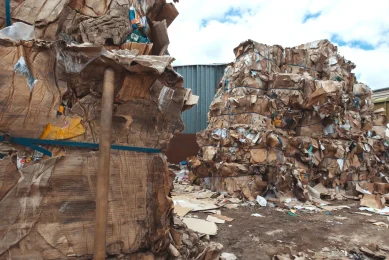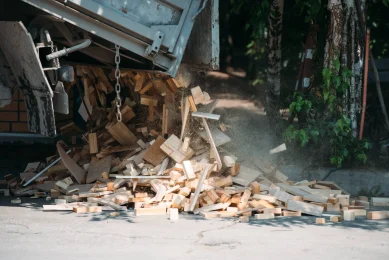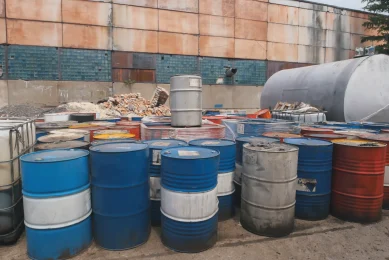What is industrial waste? Definition and examples
Industrial waste is group of waste generated by business activities. These are materials that are unnecessary on site and inert to the environment.
It is estimated that industrial waste accounts for more than 90 % of the total waste generated in Poland. It is generated not only in production facilities (post-production waste), but also in warehouses, construction sites, medical facilities and vehicle and machine maintenance.
Industrial waste includes, among others:
- waste from car services (used car parts, oil and grease),
- packaging waste,
- used cleaning cloths,
- wood offcuts and furniture boards,
- chemical substances and reagents,
- waste from the use and disposal of paints and varnishes,
- post-production residues from plastic, glass, metal,
- waste electrical and electronic equipment,
- metallurgical and power plant waste (ash, slag, dust).
Approximately 80% by weight of industrial waste comes from mining, metallurgy and power generation.
Division, types and classification of industrial waste
The simplest division of industrial waste includes:
- liquid waste, e.g. paints, solvents, chemical liquids, contaminated water, sludge from sewage treatment plants,
- solid waste, e.g. cardboard boxes, scrap metal, plastic films, rubble.
From the point of view of businesses generating industrial waste, of greater importance is the the breakdown of industrial waste into groups, subgroups and types introduced by the waste catalogue (OJ 2020.10). It groups the different types of waste according to their source of generation, their properties (e.g. characteristic of hazardous waste) and the composition and levels of hazardous substances they contain.
Industrial waste is included in groups 1 to 19 of the waste catalogue. A special category of industrial waste is hazardous waste, which is marked with an asterisk (*) in the catalogue.
Industrial waste management in the company: segregation and storage
Every entrepreneur who generates industrial waste is obliged to reduce its quantity and minimise its negative impact on the environment. These obligations apply to each of the stages of waste management: from generation, through sorting, storage, transport, recovery and sometimes disposal.
The generator of industrial waste is obliged to collect it separately at the place where it arises, e.g. at the production plant, storage hall or point of sale. Waste must be sorted in such a way as not to change their nature and composition and to prevent mixing of different types of waste with different codes. For the segregation of industrial waste, entrepreneurs usually use waste containers (e.g. two-wheelers, four-wheelers), covered and open containers with capacities of up to 2.5 to 36 m3, as well as modern compaction machines - compactors that enable efficient compaction of waste and automation of waste collection.
[ew link].
The conditions for the storage of industrial waste are set out in the Waste Act (Journal of Laws 2023.1587) and the implementing acts issued on its basis. The most important principle is the obligation to adapt the method of storage (place, type of containers) to the type of waste and the the need to label the containers with the appropriate codes according to the BDO catalogue.
Industrial waste can be stored for a maximum of 3 years. An exception is waste subject to landfilling, which may be stored for a maximum of 1 year. Before the expiry of these time limits, the entrepreneur is obliged to remove the waste or to order a service to collect the industrial waste and transport it to a processing plant or a landfill.
Collection of production and industrial waste
The frequency of industrial waste collection from the company should be adapted to the technological and organisational processes in operation. For smaller volumes of waste generated, it is better to order waste collection each time. For large volumes, many entrepreneurs prefer to conclude a contract with an industrial waste collection company and create an automated collection schedule with the help of the Interzero Waste Platform.
In addition to coordinating the collection of waste, the contractor must also issue Waste Transfer Notes, preferably some time in advance. When the waste is handed over to a transport company with the appropriate permits, the KPO must already be fully completed.
Management of industrial and post-production waste
Industrial waste is a very broad and diverse group of wastes. Depending on their origin, composition and properties, they require different management methods. For this reason, entrepreneurs who generate industrial and post-production waste usually hand it over to to specialised recovery or disposal facilities.
The management of industrial waste in Poland can take place in several ways:
- storage prior to other disposal or recovery processes,
- recycling and recovery of industrial waste,
- incineration in an industrial waste incinerator,
- storage (of waste and incineration residues) in appropriately prepared industrial waste landfills.
When selecting an industrial waste management facility, it is worth paying attention to the permits it holds (e.g. for waste collection and processing) and concessions (e.g. for industrial waste storage, integrated permit). Only handing over the waste to a company with the necessary permits relieves the producer of the responsibility for its management. It is also worth remembering that this responsibility is not removed by the collection of waste by the transport company - the producer is responsible for the waste until it is delivered to the recycler. For this reason, it is advisable to use only trusted, reliable companies offering collection and transport of industrial waste.
Industrial waste records at BDO
An important legal obligation for entrepreneurs managing industrial and post-production waste is to register with the BDO and keep quantitative (weight of waste generated) and qualitative (types of industrial waste to which 6-digit codes are assigned) records of this waste. Depending on the quantity and type of industrial waste generated, this can be a full or simplified record.
All traders on the BDO register have obligation to issue an electronic KPO when waste is transferred e.g. for recovery or disposal. A separate KPO should be created for each type of waste and indicated therein:
- details of the companies: generating, transporting and receiving the waste,
- weight and waste code,
- date and time of handover,
- the registration number of the vehicle which collects the waste.
If the data entered are correct, the KPO will be accepted and will complete its circulation in BDO. If not, the entrepreneur is obliged to correct the KPO.
Electronic Waste Transfer Cards are the basis for creating records on the Waste Record Card. An entrepreneur obliged to keep full records of industrial waste must create KEO entries on an ongoing basis. It is also obliged to submit annual waste data set. Such an annual report must be submitted to the Marshal by 15 March of the current year for the previous year.
Industrial waste management in one place - experience the Interzero Waste Platform
Most of the duties related to the BDO industrial waste register and the company's entire waste management can be carried out online, in one centralised place. The Interzero Digital Waste Platform is a tool integrated into the BDO that automates tedious and time-consuming record-keeping procedures, as well as enabling management of waste collections at the company's headquarters and branches.
With the Interzero Waste Platform you will gain:
- reducing waste management costs (optimisation of logistics, waste management and labour costs),
- simple login, without the need for trusted profile authentication,
- the function of scheduling the collection of individual waste fractions,
- option 1-click ordering of waste collection,
- automation of waste records in BDO,
- the ability to manage the company's waste management onlinewithout having to install additional software,
- a digital repository for all the company's environmental documentation,
- the ability to create any reports and statistics and access all company data in real time.
The Waste Platform is a tool created by Interzero - the market leader in environmental services - in response to the needs of waste management entrepreneurs. It was integrated with BDO in the first days of the system's operation and has since been continuously improved and developed with new functionalities, thanks to which waste management in your company becomes faster, simpler and cheaper. You can test all the features of the Interzero Waste Platform now for free for up to three months.



